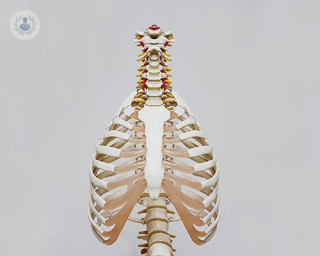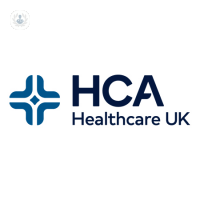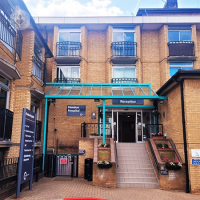What is bronchiectasis?
Bronchiectasis is a chronic lung disease that damages the major airways of the lungs, causing them to widen. There can be two types:
- Congenital bronchiectasis: this is present from birth.
- Acquired bronchiectasis appears later in life.

What are the symptoms of bronchiectasis?
Symptoms develop gradually and may appear months or years later. The main ones are:
- A daily cough that occurs over months or years
- Coughing up large amounts of sputum (spit) with mucus
- Coughing up blood
- Wheezing
- Difficulty breathing, especially during exercise
- Chest pain
- Bad breath
- Clubbing of fingernails and toenails
- Fatigue
- Weight loss
How can bronchiectasis be diagnosed?
Early identification is the best way to prevent the condition from worsening. If patients have symptoms suggestive of bronchiectasis, an HRCT, blood test, sputum analysis (analysis of saliva and mucus) and lung function tests can diagnose the condition.
What are the causes of bronchiectasis?
Bronchiectasis can be caused by many different factors. The most common cause of bronchiectasis is recurrent respiratory tract infections. These cause inflammation and damage to the airways.
Genetic causes include cystic fibrosis, which is a condition that affects the cilia, the hair-like structures that sweep mucus out of the lungs.
People with a weakened immune system, asthma and primary ciliary dyskinesia are at a higher risk of developing the condition. Other causes include previous tuberculosis infections, rheumatoid arthritis and inhaling foreign bodies.
Can bronchiectasis be prevented?
If the disease is congenital, it cannot be prevented, although the risk of complications can be reduced by treating lung infections early. On the other hand, if a person avoids smoking and reduces their exposure to pollution, they can reduce their risk of respiratory infections. The annual flu vaccine and childhood vaccines can also help to reduce the chances of some infections.
What is the treatment for bronchiectasis?
The main treatment is daily drainage to eliminate sputum, the mucus that gets caught in the airways. Daily postural drainage exercises help with this. Patients are given antibiotics and expectorants to heal any chest infection. Patients who experience frequent chest infections must take prophylactic antibiotics two or three times a week.
12-14-2015 10-18-2023
Bronchiectasis
Dr James Ramsay - Pulmonology & respiratory medicine
Created on: 12-14-2015
Updated on: 10-18-2023
Edited by: Conor Dunworth
What is bronchiectasis?
Bronchiectasis is a chronic lung disease that damages the major airways of the lungs, causing them to widen. There can be two types:
- Congenital bronchiectasis: this is present from birth.
- Acquired bronchiectasis appears later in life.

What are the symptoms of bronchiectasis?
Symptoms develop gradually and may appear months or years later. The main ones are:
- A daily cough that occurs over months or years
- Coughing up large amounts of sputum (spit) with mucus
- Coughing up blood
- Wheezing
- Difficulty breathing, especially during exercise
- Chest pain
- Bad breath
- Clubbing of fingernails and toenails
- Fatigue
- Weight loss
How can bronchiectasis be diagnosed?
Early identification is the best way to prevent the condition from worsening. If patients have symptoms suggestive of bronchiectasis, an HRCT, blood test, sputum analysis (analysis of saliva and mucus) and lung function tests can diagnose the condition.
What are the causes of bronchiectasis?
Bronchiectasis can be caused by many different factors. The most common cause of bronchiectasis is recurrent respiratory tract infections. These cause inflammation and damage to the airways.
Genetic causes include cystic fibrosis, which is a condition that affects the cilia, the hair-like structures that sweep mucus out of the lungs.
People with a weakened immune system, asthma and primary ciliary dyskinesia are at a higher risk of developing the condition. Other causes include previous tuberculosis infections, rheumatoid arthritis and inhaling foreign bodies.
Can bronchiectasis be prevented?
If the disease is congenital, it cannot be prevented, although the risk of complications can be reduced by treating lung infections early. On the other hand, if a person avoids smoking and reduces their exposure to pollution, they can reduce their risk of respiratory infections. The annual flu vaccine and childhood vaccines can also help to reduce the chances of some infections.
What is the treatment for bronchiectasis?
The main treatment is daily drainage to eliminate sputum, the mucus that gets caught in the airways. Daily postural drainage exercises help with this. Patients are given antibiotics and expectorants to heal any chest infection. Patients who experience frequent chest infections must take prophylactic antibiotics two or three times a week.


Bronchiectasis: A patient-friendly overview
By Dr Shalin Diwanji
2025-01-28
Bronchiectasis is a long-term lung condition where the airways (bronchi) become widened and damaged, leading to excess mucus production. This damage makes it harder for the lungs to clear mucus, increasing the risk of infections. Over time, this creates a cycle of infection and inflammation that worsens lung function. Revered consultant in respiratory medicine Dr Shalin Diwanji explains more about the condition. See more


FAQs on Bronchiectasis
By Dr Grace Robinson
2025-01-28
Bronchiectasis is a fairly common chronic lung condition. Its common causes include pneumonia, non-tuberculosis mycobacterium, and tuberculosis. We decided to get in contact with Dr Grace Robinson who is an expert in bronchiectasis, to find out who is most affected by it, what the symptoms are, how flare ups are managed and whether it is dangerous (we also found out the life expectancy for someone with this condition). See more


Bronchiectasis: Symptoms, treatment and outlook
By Dr James Ramsay
2025-01-28
If you have been diagnosed with bronchiectasis, you might be wondering what the long-term outlook is when living with the condition. The good news is that if you adhere to your management plan with your doctor, the condition is completely controllable and shouldn't have a significant impact on your living. Renowned respiratory medicine consultant, Dr James Ramsay, explains more. See more


Bronchiectasis; causes, treatment and prevention.
By Dr Shanthi Paramothayan
2025-01-27
If you are experiencing persistent chest infections, chronic cough, fatigue and weight loss, you could be showing signs of bronchiectasis. Top Doctor Shanthi Paramothayan talks about the causes of bronchiectasis and the treatments that are available. See more
Experts in Bronchiectasis
-
Dr James Ramsay
Pulmonology & respiratory medicineExpert in:
- Sleep apnoea
- Chronic cough
- Lung cancer
- Asthma
- Chronic obstructive pulmonary disease (COPD)
- Bronchiectasis
-
Professor Indranil Chakravorty
Pulmonology & respiratory medicineExpert in:
- Asthma
- Chronic obstructive pulmonary disease (COPD)
- Sleep disorders
- Bronchiectasis
- Cough
- Respiratory infection
-
Dr Muhammed Raashed
Pulmonology & respiratory medicineExpert in:
- Chronic cough
- Asthma
- Chronic obstructive pulmonary disease (COPD)
- Breathing problems
- Sleep apnoea
- Bronchiectasis
-
Dr John Chinegwundoh
Pulmonology & respiratory medicineExpert in:
- Coronavirus
- Cough
- Shortness of breath
- Asthma
- Chest infection
- Bronchiectasis
-
Dr Ricardo Jose
Pulmonology & respiratory medicineExpert in:
- Chest infection
- Bronchiectasis
- Shortness of breath
- Chronic cough
- Asthma
- Respiratory diseases
- See all

The Lister Hospital - part of HCA Healthcare
The Lister Hospital - part of HCA Healthcare
Chelsea Bridge Road, London
No existe teléfono en el centro.
By using the telephone number provided by TOP DOCTORS, you automatically agree to let us use your phone number for statistical and commercial purposes. For further information, read our Privacy Policy
Top Doctors

Cleveland Clinic London Hospital
Cleveland Clinic London Hospital
33 Grosvenor Place, SW1X 7HY
No existe teléfono en el centro.
By using the telephone number provided by TOP DOCTORS, you automatically agree to let us use your phone number for statistical and commercial purposes. For further information, read our Privacy Policy
Top Doctors

Hendon Hospital - part of Circle Health Group
Hendon Hospital - part of Circle Health Group
46/50 Sunny Gardens Rd, London NW4 1RP
No existe teléfono en el centro.
By using the telephone number provided by TOP DOCTORS, you automatically agree to let us use your phone number for statistical and commercial purposes. For further information, read our Privacy Policy
Top Doctors
-
The Lister Hospital - part of HCA Healthcare
Chelsea Bridge Road, London , Central LondonExpert in:
- Cancer
- Cardiology
- Orthopaedic surgery
- Pregnancy
- Physiotherapy
- Women’s health
-
Cleveland Clinic London Hospital
33 Grosvenor Place, SW1X 7HY, Central LondonExpert in:
- Cardiology
- Colorectal surgery
- Minimal access surgery (keyhole surgery)
- Gallbladder surgery
- Diagnostic Imaging
- Ultrasound
-
Hendon Hospital - part of Circle Health Group
46/50 Sunny Gardens Rd, London NW4 1RP, North LondonExpert in:
- Cardiology
- General Surgery
- Gastroenterology
- Hand and wrist
- Nutrition and Dietetics
- Foot and ankle
- See all
- Most viewed diseases, medical tests, and treatments
- Respiratory infection
- Snoring
- Autoimmune diseases
- Long Covid
- Respiratory failure
- Sleep disorders
- Lung cancer
- Asthma in children
- Sleep apnoea
- Pulmonary nodule







